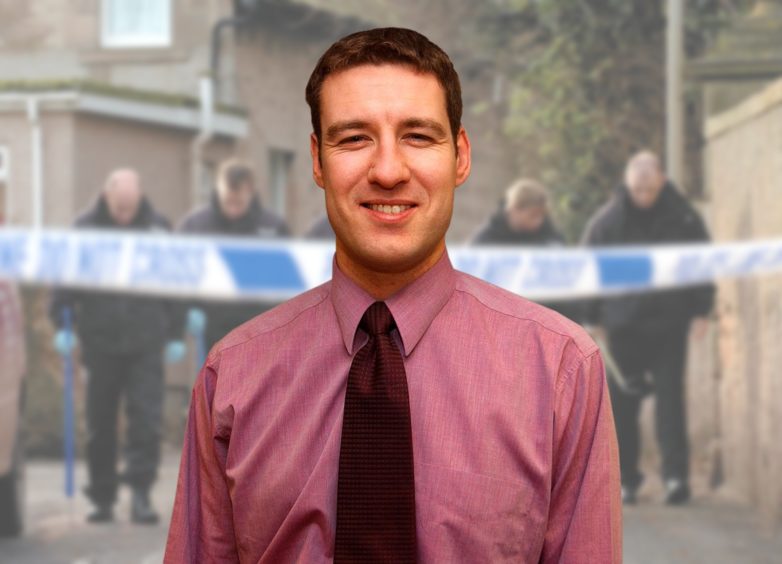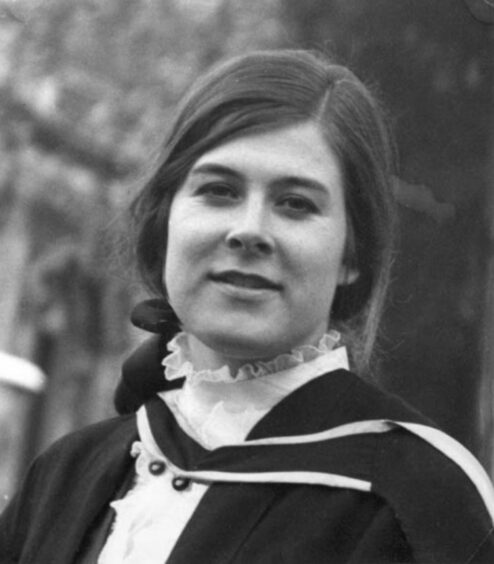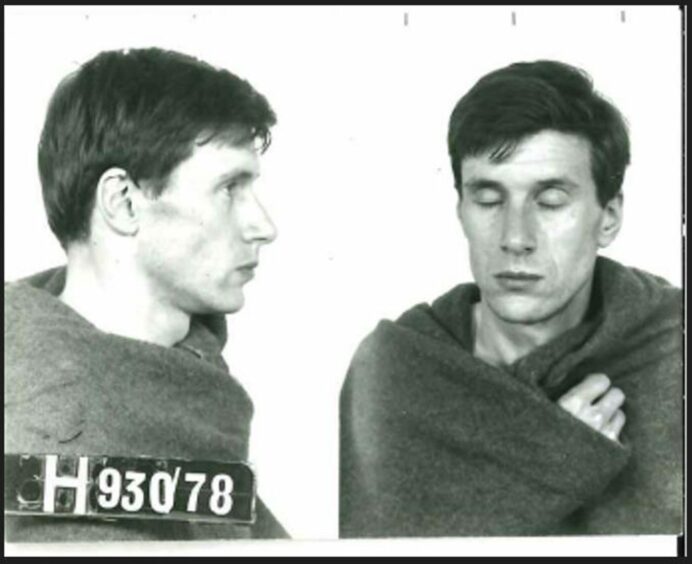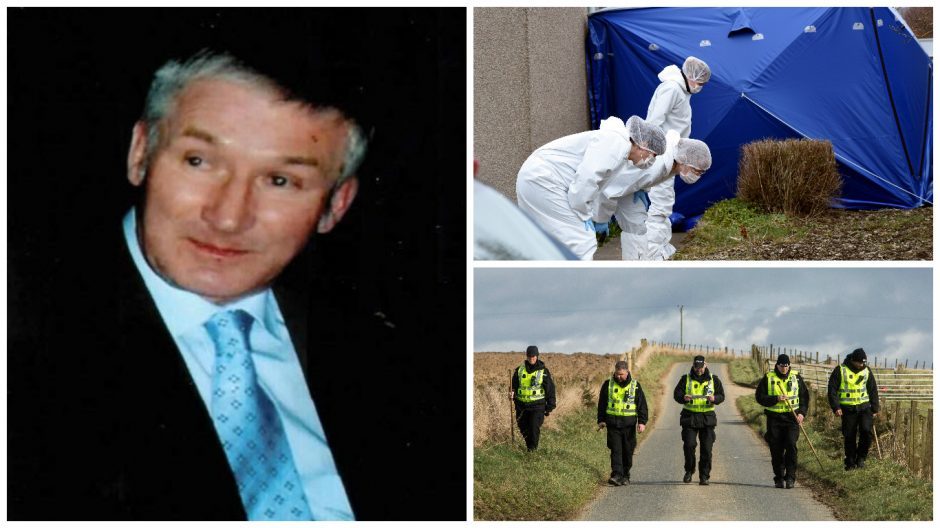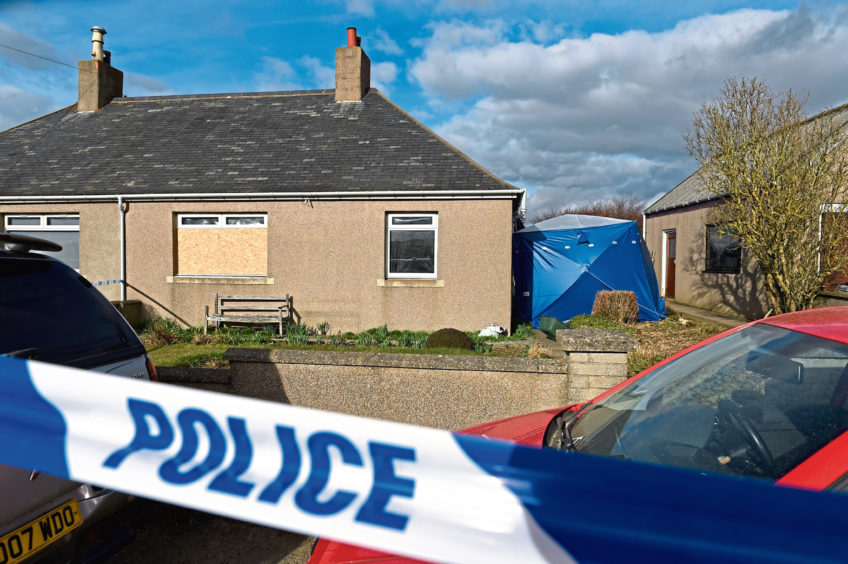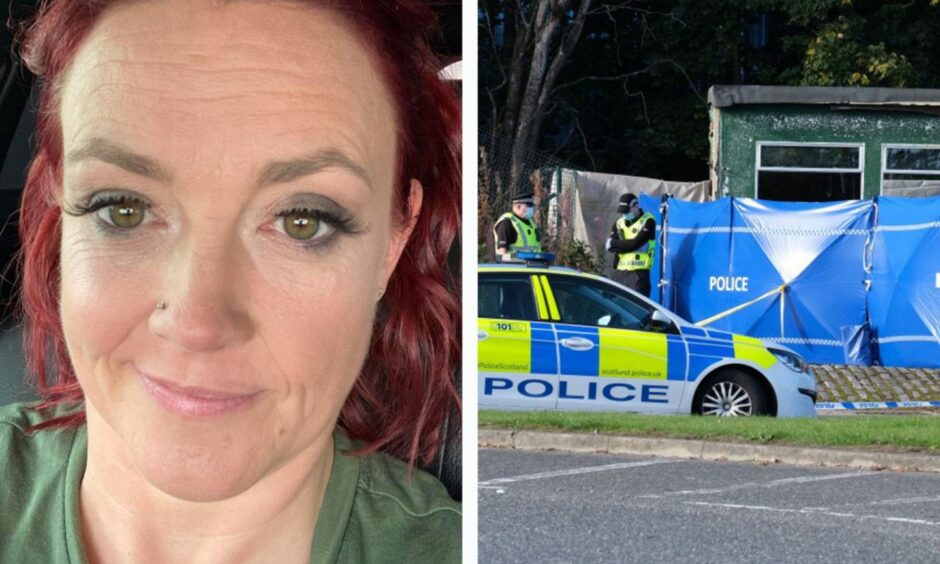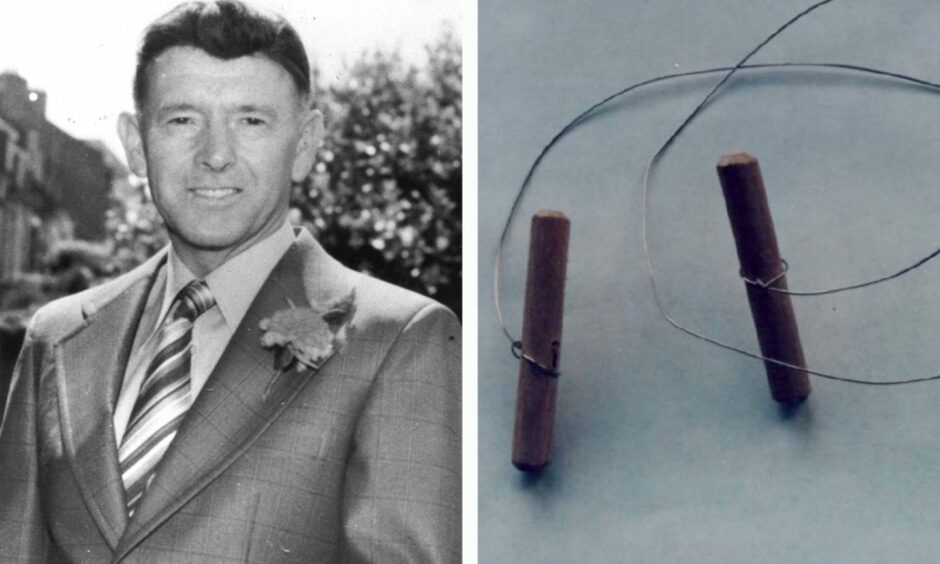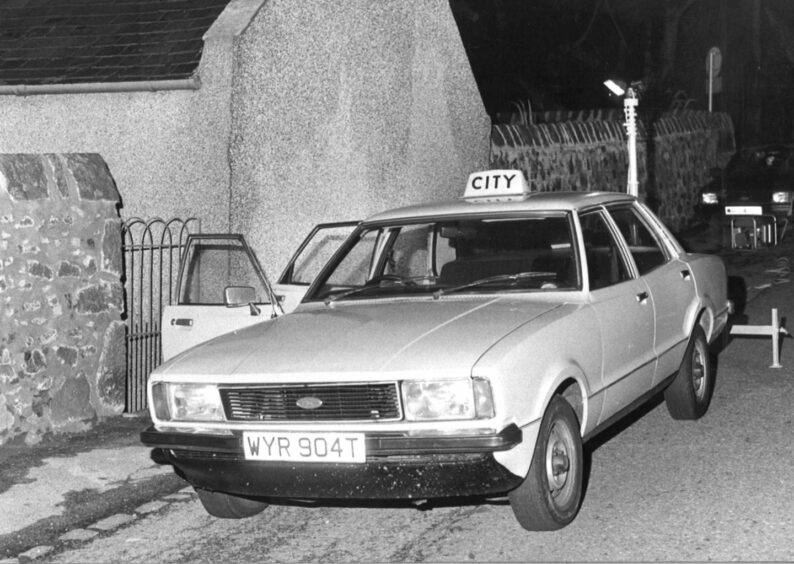
“I always enjoyed the more serious stuff,” the now-retired Detective Inspector Gary Winter remarked, adding: “It was probably that desire to get victims justice”.
After 30 years of working in policing, first under Grampian Police and then Police Scotland, the former Det Insp sat down with The Press and Journal to reflect on the highs and lows of his career.
And, in a frank two-hour interview, he revealed previously unreported details about his most unforgettable murder cases – both past and present – that have rocked the region.
The 52-year-old challenged the public perception of the unsolved killing of Nairn banker Alistair Wilson, 30, who was gunned down on his doorstep in November 2004.
“I think unlike any other, Alistair Wilson’s murder has been sexed up beyond belief,” he said.
Wild claims about murdered banker ‘just made up’
Mr Winter described the victim, a married father-of-two, as a “pretty quiet family guy” who “doted” on his loved ones – doing little else other than working in banking.
But his profession and lack of publicised developments in the police probe have led to wild speculation over the years.
It has included that Mr Wilson had “links to the IRA” and “links to all sorts of other stuff that’s just made up,” Mr Winter commented.
Separately, an insider of Northern Constabulary’s original police inquiry has rejected suggestions of any connections with organised crime.
They confirmed that the tragic Bank of Scotland employee actually had no access to large sums of money and merely filled out business loan application forms for clients.
The legacy force also interrogated all corners of Mr Wilson’s private life, looking for any signs of infidelity on his part, but could find none – the source said.
Person of interest in detectives’ sights
Today, detectives have a person of interest in their sights, a former emergency service worker turned convicted criminal, who lived in Nairn, regularly drank at the Havelock Hotel – opposite the Crescent Road crime scene – and whose neighbours believed he kept guns at home.
Police believe the motive of the deadly attack was a planning application row over decking at the pub across from the Wilson’s home, to which Alistair objected.
Mr Winter added: “I watch a lot of these firearms experts claiming it’s not the gun that you would use as a hitman. It’s just that’s what the killer had.
“This is almost like we live in America, where you can go to a gun shop and you’ve got a whole selection of guns there to wonder, ‘What one am I going to use for this job?’
“The reality is, guns should be and I think are pretty difficult to get your hands on and sometimes you’ve got to use whatever you’ve got.
“If that happens to be a small .265 Haenel Suhl Schmeisser World War 1 pistol, that’s what you use, because (referencing the movies) you don’t have the Kingsman outfitters, where the doors open and you’ve got a whole selection of weaponry to choose from.
Capturing and convicting killer who evaded justice for four decades
Earlier this year, on March 9, Mr Winter celebrated arguably his biggest-ever achievement, the conviction of a killer who evaded capture for more than four decades.
A jury found Christopher Harrisson, 82, guilty of beating to death his ex-wife Dr Brenda Page – an Aberdeen scientist – at her Allan Street flat in July 1978.
Her head and face had been struck at least 20 times during the brutal attack.
Harrisson’s 32-year-old victim had previously suffered long-term domestic abuse and coercive control at his hands over the years.
He was eventually jailed for life with a judge ordering he serve a minimum of 20 years before he can apply for parole, meaning he’ll never leave prison alive.
Explaining events behind the scenes between 1978 and 2015, Gary Winter claimed that Harrisson could have been prosecuted 45 years ago had there been a greater “appetite for a circumstantial court case”.
‘In 1978, things were very different’
Mr Winter also explained the challenge of having to “persuade” prosecution officials to move forward, when leadership at the top changed from one Lord Advocate to another.
Differences in the law, police standards, and the changing awareness of and attitudes toward domestic abuse and coercive control spanning the decades also had an impact on cracking the case for good.
“There was lots of discussion around what ‘arrest’ meant in 1978. It’s a strange question to get asked but it was difficult to get a straight answer out of anyone.
“For us to use a lot of Christopher Harrisson’s information that he gave at his original interview it had to be accepted that he was given the right to be silent and had access to a solicitor.
“In 1978, things were very different and people didn’t record as much as they do now.
“The first bit of legislation that came in for how the police deal with suspects properly was 1980.
“So, prior to 1980, there was no formal structure to interviewing a suspect,” Mr Winter explained.
‘That’s it. Give me my key back. I never want to see you again. We’re done’
He revealed the many issues that had to be resolved over time in order to get the case to court, a challenge that required a labour-intensive team effort.
“Statements back in 1978 were sometimes one page or even half a page, the briefest of details because the officers back then would have had less of an understanding of the intricacies of little bits of evidence.
“You wouldn’t have had a crime of stalking, so, a lot of them would have been thinking, ‘What’s the point of all of this, where’s this going’?”
Mr Winter also spoke of an earlier “confusion” surrounding Brenda’s behaviour in the pre-knowledge of coercive control.
“We’re trying to say this guy is really awful. She’s desperately scared of him – painting her window shut so he can’t break in – but she’s going away to a conference in Mexico with him, sleeping in the same room.
“What any prosecutor wouldn’t have wanted is to have a trial that became a catastrophe, a disaster, with a not guilty verdict causing reputational damage to themselves.
“But everything pointed to Harrisson,” he said. “All the circumstantial evidence was there.
“We had the understanding of coercive control, that she was at her greatest risk when she finally left – and she had said to him in the weeks before she went away, That’s it. Give me my key back. I never want to see you again. We’re done’.”
Key witnesses were reinterviewed in more detail
In 2015, the authorities identified key witnesses, who spoke about Brenda’s relationship with Christopher Harrisson.
“We had some witnesses giving new evidence, and police and prosecutors with a better understanding of coercive control.
“Those witnesses who came forward or that we reinterviewed gave us a bit more,” Mr Winter explained.
“Nowadays our statements are long, going into the intricate details of relationships, and the witnesses gave much more detailed statements.
“At the point where the prosecution had agreed to go for it in 2020, they identified key people who were also then video recorded.
“They were revisited for a third time to capture their evidence for a number of reasons.
“One of those was that they were of a certain age, 40/45 years older than when the murder had happened. We lost some of them and had to use their DVD as evidence.”
Brenda Page ‘would still be alive’ if approaching today’s police for help
Mr Winter also revealed his “gut feeling” that Brenda “would still be alive” if she was living in the present day under the public protection of today’s modern policing.
He believes Harrisson “would have been locked up for stalking” before the research scientist could bludgeon his ex-wife.
“In a very limited capacity, she went to the police when he’d broken into her flat previously, but only to warn him, which is a typical sign of not wanting to stir up a hornet’s nest,” he explained.
“She didn’t want him arrested and charged, but just given a gentle warning so he didn’t come back again.
“But she’d gone to the trouble of getting an interdict and a solicitor.
“So, at that point, when she’s looking for help, I’d like to think that in 2023 a solicitor would feel obliged to notify law enforcement domestic abuse officers or at least some of the charities that support victims.
“That gets the ball rolling and we can go and ask the sort of questions which, if she’s honest with us, would identify the level of risk that she’s probably at and try to encourage her in all the right directions.
“If she wants to pursue it, brilliant. I’d hope that would have deterred him.”
Back-to-back murders of sex worker and a pensioner
In late 2015, Gary Winter was promoted from Detective Sergeant to Detective Inspector and assigned to work for Police Scotland’s Major Investigation Team.
Then he experienced his first-ever back-to-back Category A (highest profile, highest priority) murder cases, beginning with Nkechi McGraa, also known as Jessica.
The sex worker, a 37-year-old married mum, was discovered dead in a rented Aberdeen apartment on Union Terrace after she had been raped and murdered in February 2016.
At the time, the unknown culprit, 26-year-old Robert Gordon University student Chinda Bala – the son of a Nigerian diplomat – was undetected by the police.
Mr Winter said he came under incredible pressure as news of Jessica’s death began circulating.
“Almost straight away, I’m getting phone calls, even from outside the UK, including Ireland.
“I had agencies that represent street prostitutes and charities that support them demanding to know if there was a wider risk to other people.”
Before Chinda was caught with the help of examining mobile phone communications, taxi records, CCTV camera footage and DNA, Mr Winter had the “difficult” task of eliminating Jessica’s clients from the inquiry.
“It was extremely intrusive on people’s personal lives,” he said. “We’re trying to alibi somebody, who may be in a relationship, while their partner’s querying why we’re asking and we’re responding, ‘To try and eliminate them from the murder of a prostitute’.
However, the cooperation and honesty of Jessica’s clients helped Gary Winter to single out Chinda as the one and only suspect and he was later sent to prison for a minimum of 18 years.
“She always had customers wear a condom,” he explained. “After sex had concluded she would use a wet wipe to take off the condom and then use a nappy sack.
“We found the right amount of nappy sacks from which we could get DNA to eliminate all but Bala Chinda, who didn’t follow the same pattern of the way Jessica operated.
“He tried to blag sex with her for free and she got bored of that after a period of time and then he tried to pretend that he had gone and got some money but he hadn’t and then just raped and murdered her.”
‘Missed opportunity’ blunder in OAP’s death made it the ‘hardest’ case
Finding the brutal killer of Brian McKandie – a 67-year-old mechanic of Fairview Cottages, Badenscoth, near Rothienorman – was to be Mr Winter’s “hardest” case.
“We were unfortunately delayed in getting started due to a missed opportunity,” he said.
“Some of the initial attending officers, although still an unexplained death, weren’t so sure if it was a homicide.
“They convinced themselves that Mr McKandie, who had suffered multiple injuries, had an accidental fall and that he hadn’t been the victim of a crime.”
That cost the delayed murder investigation valuable time, he said.
“We suffered a lot from the vacuum of information for those few days.
“By the time we actually got it declared murder and it was handed on for us to investigate, we were behind.
“That probably caused us the most difficulty and it’s a difficult conversation with the family and the media, as you can imagine.”
A roadblock reconstruction was carried out two weeks after the March 2016 murder.
“We identified somebody quite quickly who says, ‘I saw a boxy burgundy estate car at the address and a couple of guys that looked a bit rough’,” Mr Winter said.
“That goes out to the media. That’s all we have at this point. The initial delay, resulting in us putting out an early media release, resulted in an awful lot of work – six months of my life – trying to get to the bottom of all of these other sightings that were reported.
“The truth of the matter is, it’s called confabulation, which means when a witness, who is trying their best to help you, merges memories to make it fit.
‘Dark moments’ with ‘a lot of pressure’
“We eventually find the two guys in that car. They had been in the area, but a month before the murder.”
Mr Winter described having “dark moments” halfway into the investigation.
“We didn’t know where it was going and we were not sure if we’d ever solve the case, so, there was a lot of pressure on us,” he remembered.
“We then start to wonder, ‘What did we miss in that initial period’?”
Eyewitnesses were key in placing cruel and calculated Steven Sidebottom at the tragic Aberdeenshire pensioner’s home the day before he was killed.
“Our evidence supported that he was out there on the Thursday night – not really with an explanation, seen there by witnesses – but coincidentally he hadn’t taken his mobile phone with him.
“It was elsewhere, making him look like he could also have been elsewhere.
“A family turned up unannounced to collect their car, which had an MOT, and then they found him and he left without engaging Brian McKandie.
“We obviously worked out who he was from that encounter. Then the next night, on the Friday, he had his phone when he returned to the property.
Almost a year later, Sidebottom was charged with murder as part of a planned robbery.
“It was a totally circumstantial case with no forensic evidence and no eyewitnesses but I was absolutely certain that we had the right person.”
Sidebottom was eventually jailed for a minimum of 21 years for Mr McKandie’s murder.
‘A woman should be free to walk home’
In one of his most recent murder cases, Gary Winter was deployed to help with investigating the rape and murder of Aberdeen mum Jill Barclay.
As the crime scene coordinator, he was responsible for managing the resources for multiple crime scenes, from Dyce all the way to Ballingry in Fife – where the killer lived with his family.
The 47-year-old had been followed by Rhys Bennett, 23, who dragged her into the back of the derelict Farburn Gatehouse property – opposite the Stoneywood Road/Victoria Street roundabout – as she was walking home alone in September 2022.
She had been on a night out, beginning with the Adam Ant concert at Aberdeen Music Hall and ending with drinks at the Spider’s Web pub, where she met the stranger.
“There were sliding doors moments when, if Jill didn’t do one thing that night – if she hadn’t left the concert as early as she did, or if she got a later return train, or if she hadn’t gone into the Spider’s Web – she would be alive today and we wouldn’t know anything about it,” Mr Winter suggested.
“You do look at, not what people have done wrong but, if there was anything that could have been done to protect her, but then you ask, ‘Why are we even speaking about that?’
“A woman should be free to walk home.”
When Bennett pled guilty to the savage attack and was sent to prison for a minimum of 24 years, it emerged that he had even set the mum-of-two on fire, while she was still alive.
It was also revealed at the High Court in Edinburgh that the Petrofac engineer’s screams had been heard by nearby witnesses who did not come to her aid or contact the police.
But Mr Winter added that he was “sure” those people would have called for help if they knew what was happening.
“You hear teenagers screaming, being noisy or underage drinkers, all the time. That can be confused with other things,” he said.
“It’s difficult to know if it would have made any difference if they had phoned 999 because the pair were behind the building and we don’t know what police search would have actually happened.”
‘It is your civic duty to help bereaved families’
The father-of-three finished his exclusive ‘exit interview’ with The Press and Journal with an appeal to the public.
He urged anyone with information that might help to crack an ongoing case to come forward.
“Please do not assume that the police know the information you hold,” he said, explaining: “The police only know what they are told.
“They can quickly check if the information you have is already known to the investigation and look into it further to see if it is relevant to the murder.
“It is your civic duty to pass on this information to try to help the bereaved families.”
‘They’re still worked on, on a daily basis’
He reminds us that the police probe into the fatal shooting of Nairn Banker Alistair Wilson remains ongoing.
That’s as well as inquiries into the brutal death of Aberdeen taxi driver George Murdoch, 58, who was viciously garrotted with a cheese wire by a passenger on Pitfodels Station Road, near Cults, almost 40 years ago in September 1983.
“Both murders are live investigations,” Mr Winter said. “They’re still being worked on, on a daily basis. I believe both are solvable and am hopeful they will be solved”.
Speaking about catching the so-called Cheese Wire Killer, so named because of the man’s unusual choice of weapon to kill Mr Murdoch, Gary Winter revealed: “There’s nobody who’s ever reached what’s termed suspect status.
“If you went out and stopped ten people today in Aberdeen, one of them would probably think that they could give you information about somebody they’d heard about that had been responsible for George Murdoch’s murder.
“But a lot of it is bravado, myth that’s built up over time, or they’ve got the name wrong.
“You get lots of information – it’s a crime like no other – and at random times you will get phone calls about it. There is a lot of noise out there.
“The amount of evidence gathered for George Murdoch’s case – eyewitnesses of the attack, a murder weapon and so on – is significantly greater than the Brenda Page case.
“I’ve got more than I’ve had for lots of other murders that have resulted in an outcome. I do think that we’ll get there one day, definitely.”
For all the latest court cases in Aberdeen as well as crime and breaking incidents, join our Facebook group.
